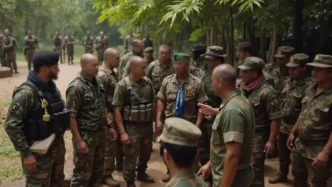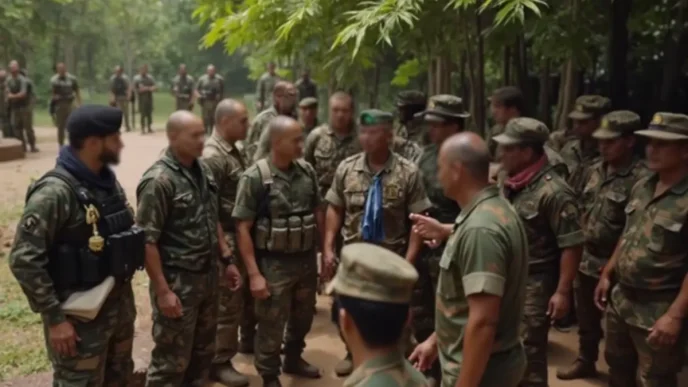The International Criminal Court (ICC) has refrained from confirming or denying recent reports of an arrest warrant for former Philippine President Rodrigo Duterte, linked to alleged crimes against humanity during his administration’s brutal war on drugs. ICC spokesperson Fadi El Abdallah told INQUIRER.net on Monday that the court would only issue statements through official channels, maintaining confidentiality to protect the integrity of ongoing investigations and the safety of victims and witnesses.
Over the weekend, unconfirmed reports surfaced claiming the ICC had issued a warrant for Duterte, stemming from his policies as mayor of Davao City and later as president, during which thousands of extrajudicial killings were allegedly carried out under the guise of anti-drug operations. The speculation intensified after Duterte travelled to Hong Kong to attend a rally with Filipino supporters, prompting renewed scrutiny of his international movements. However, El Abdallah explicitly declined to comment on the reports, reiterating that no official press release had been issued by the court.
“The ICC announcements come from our official channels,” El Abdallah said in a message to INQUIRER.net. “Confidentiality is a crucial part of this work and is essential to protect the integrity of investigations and to ensure the safety and security of victims and witnesses.”
The ICC’s Office of the Prosecutor continues to investigate the situation in the Philippines, focusing on alleged crimes committed between 1 November 2011 and 16 March 2019—a period that covers Duterte’s tenure as mayor and part of his presidency. This timeline remains significant despite the Philippines’ withdrawal from the ICC’s Rome Statute, which took effect on 17 March 2019. ICC Special Prosecutor Karim Khan has previously clarified that the court retains jurisdiction over alleged abuses during this period, as the country was still a party to the statute when the incidents occurred.
A Controversial Legacy and Legal Limbo
Rodrigo Duterte’s presidency, which spanned from 2016 to 2022, was marked by a hardline stance on illegal drugs, often described by critics as a violent crackdown that disproportionately targeted the poor. Official figures from the Philippine government cite thousands of deaths during police operations, while human rights groups estimate the toll could be as high as 30,000, including extrajudicial killings by vigilante groups allegedly emboldened by Duterte’s rhetoric. His administration’s policies drew international condemnation, culminating in the ICC’s decision to investigate potential crimes against humanity.
The Philippines’ exit from the ICC in 2019, under Duterte’s directive, was seen as an attempt to shield the former president and his allies from international accountability. However, legal experts note that the withdrawal does not retroactively nullify the court’s jurisdiction over crimes committed while the country was a signatory. If a warrant has indeed been issued—an unconfirmed claim at this stage—it could complicate Duterte’s international travel, particularly in countries that cooperate with the ICC through Interpol.
The timing of Duterte’s Hong Kong trip has added fuel to the speculation. While the former president has not publicly addressed the arrest warrant rumours, his appearance at a rally abroad suggests a defiance of potential legal constraints. Hong Kong, as part of China—a non-ICC member state—would not be obliged to enforce an ICC warrant, even if one exists. However, should Duterte travel to a cooperating state, the situation could escalate, though this remains purely hypothetical at present.
ICC’s Mandate and Challenges in the Philippines
The ICC, based in The Hague, Netherlands, was established under the Rome Statute to prosecute individuals for genocide, war crimes, crimes against humanity, and the crime of aggression when national courts are unable or unwilling to act. In the case of the Philippines, the ICC stepped in after determining that domestic mechanisms had failed to adequately address the scale of alleged abuses during Duterte’s drug war.
Yet, the court faces significant hurdles in pursuing accountability. The Philippine government, even under Duterte’s successor Ferdinand Marcos Jr, has maintained a cautious stance towards ICC involvement. While Marcos Jr has not explicitly endorsed rejoining the court, his administration has faced pressure from both domestic activists and international bodies to cooperate with the investigation. Reports suggest that the government considers itself “obliged to follow” Interpol directives if an arrest warrant is confirmed, though no official policy shift has been announced.
For now, the ICC’s tight-lipped approach underscores the delicate nature of the probe. Confidentiality, as El Abdallah emphasised, is not merely procedural but a safeguard for those involved. Victims and witnesses, many of whom have faced threats or violence for speaking out, remain at the heart of the court’s considerations. Any premature disclosure of a warrant or other developments could jeopardise their safety and the broader investigation.
Broader Implications for Justice and Sovereignty
The speculation surrounding Duterte’s status raises larger questions about the balance between international justice and national sovereignty, a tension that has long defined the ICC’s work in Asia and beyond. Critics of the court argue that it disproportionately targets leaders from developing nations, while powerful states often evade scrutiny. In the Philippines, this sentiment resonates with segments of the population and political elite who view the ICC as an infringement on domestic autonomy.
Conversely, human rights advocates contend that mechanisms like the ICC are essential for holding leaders accountable, particularly in contexts where local judicial systems are perceived as compromised or politicised. If the allegations against Duterte are substantiated—a matter still under investigation—the case could set a precedent for addressing state-sanctioned violence in the region. However, without confirmation of a warrant or further details from the ICC, such outcomes remain speculative.
There is also the question of public perception within the Philippines. Duterte, despite his controversial policies, retains a significant base of support, particularly among those who credit his administration with reducing crime and drug-related issues, even if through harsh means. His trip to Hong Kong, framed as a show of solidarity with overseas Filipino communities, may further bolster this image among loyalists. Meanwhile, opponents see the ICC probe as a long-overdue reckoning for what they describe as a reign of terror.
What Happens Next?
Until the ICC issues an official statement, the status of any arrest warrant for Duterte remains unverified. The court’s commitment to confidentiality means that updates may not be forthcoming unless a significant procedural step—such as a public indictment or arrest—occurs. For now, observers can only piece together fragments from media reports and official reticence, a process fraught with the risk of misinformation.
If a warrant is eventually confirmed, it could mark a turning point in the ICC’s engagement with the Philippines, testing the limits of international cooperation and the country’s willingness to confront its recent past. Conversely, if no such action materialises, it may embolden critics of the court who question its efficacy in delivering justice.
As the investigation unfolds, the stakes extend beyond one individual. The ICC’s actions—or perceived inaction—could shape how future leaders in the region approach policies that skirt the boundaries of human rights. For victims and their families, the pursuit of accountability, whether through international or domestic channels, remains a deeply personal and urgent matter.
In Manila and beyond, eyes remain on The Hague, waiting for clarity on a case that encapsulates the complex interplay of power, justice, and memory in the Philippines’ turbulent political landscape.














